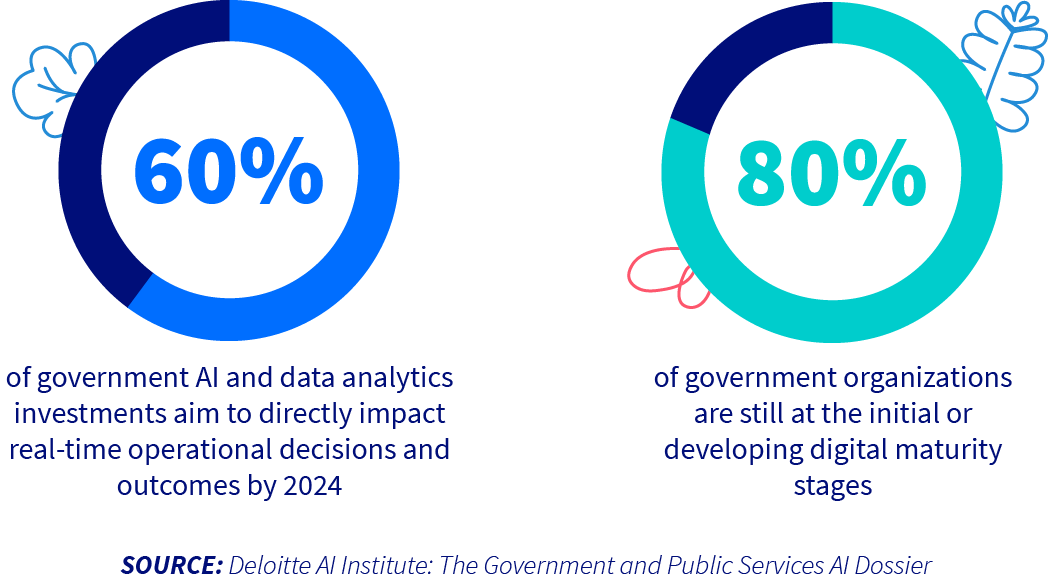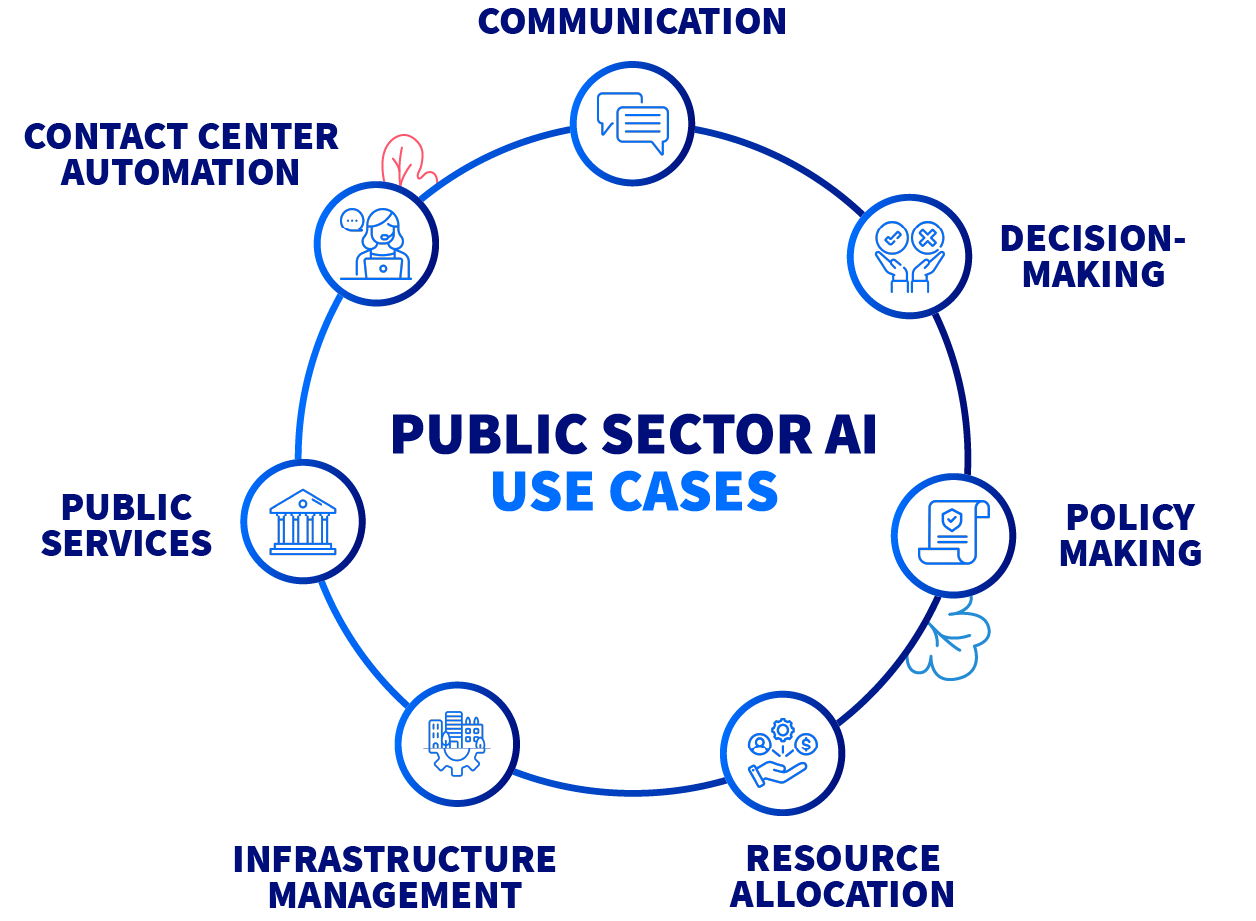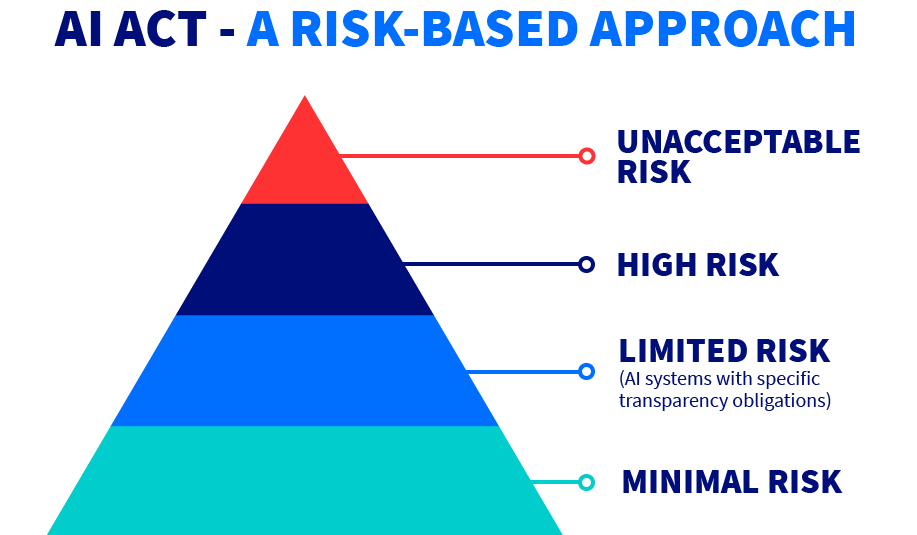It was only a matter of time before AI found its way into the public sector. That time is now. As you’ll find in our recent spotlight, the public sector is proving to be fertile ground for cost-efficient technology that simultaneously improves productivity and customer experience (CX).
Already empowering government entities to do better by their constituents, the adoption of AI is well on the rise as a result.
Examples of public sector AI adoption
- California Department of Tax and Fee Administration (CDTFA) deploys GenAI to help field 800,000 annual taxpayer inquiries by phone and chat.
- The City of San Jose uses AI to optimize public transit and proactively address street issues.
- In Brazil, AI helped automate 92% of medical registrations while cutting 2,500+ hours of patient wait time.
Still, 80% of government organizations remain in the early stages of digital maturity. Many still grapple with questions of practicality, deployment strategy, security, and cost. As this cohort continues down the path of AI, it’s worth revisiting three important considerations.

1. AI does more than automate famously inefficient services
All due respect to our friends in motor services, but organizations like the Department of Motor Vehicles (DMV) in the U.S. and its British counterpart (the DVLA) have a reputation among the people they serve. Slow and stress-inducing. They’re certainly not alone.
But they’re trying. The DVSA, for example, implemented intelligent MOT standards testing. Many stateside DMVs have undergone massive overhauls to their digital experiences (see: California DMV), making it easier for people to do a lot more online in a lot less time.
Categories of public sector AI
The applicability of AI extends beyond service automation to include:
- Decision-making
- Policy making
- Resource allocation
- Infrastructure management
- Communication
According to AI.gov, the National Oceanic and Atmospheric Administration (NOAA) uses AI to analyze weather hazards. The US Patent and Trademark Office uses it to adjudicate new patent applications. Then there is the Moments of Life Initiative, part of Singapore’s national Smart Nation initiative.
In addition to keeping people safer and adhering to higher standards, these use cases can have remarkable effects on productivity. In a recent report, Microsoft estimated that public sector workers could save 23 million hours a week using AI.

2. Constituents will feel the effects of AI, good or bad
Implementing AI for the public sector requires careful consideration. Yes, organizations stand to realize considerable benefits. In many cases, if not all, those benefits extend to constituents.
Benefits of public sector AI
- Faster, more reliable public services
- Increased safety and issue response
- More productive workforce
- Reduced operational costs
- Better decision-making by representatives
- Improved sustainability and energy usage
As do the potential consequences. What happens if an AI solution proves to be untrustworthy? Or when it fails to protect the privacy of those who use it? What about when an AI model becomes prone to “automation bias” and “selective adherence,” as found in a study from Oxford Academic?
Usually, it’s the public that ends up suffering—the very public that these technologies ought to serve.
Examples of public sector AI gone wrong
- Netherlands child care benefits scandal: faulty self-learning algorithm mistakenly punished families on false suspicion of fraud
- Robodebt fiasco in Australia: automated debt assessment system wrongly issued 470,000 debts, leaving many families in unwarranted trouble
- S. IRS algorithm bias: audited black taxpayers at 4.7 times the rate of their non-black counterparts
As far as we think AI has come since these and other incidents, they still underscore a third and critical consideration:
3. There must be balance between practicality and responsibility
Hence the concerted push for responsible AI in the contact center. Across the board, this push for responsible AI in government aims to address a few core focus areas:
- Risk mitigation
- Privacy and security
- Ethics and transparency
- Biases, fairness, and accessibility
- Compliance and oversight requirements
Frameworks and guidelines for public sector AI
- European Union AI Act: first legal framework for AI
- American Association for the Advancement of Science: responsible AI guidelines
- Bruegel: AI adoption case study
- McKinsey: pilot, scale, adopt framework for generative AI

In the public sector, AI has become part of data analytics products, customer service platforms, and cybersecurity solutions. You’ll find it in workforce collaboration tools, content management systems, and customer-facing interfaces.
The question then becomes, which solutions or service providers align with your vision for digital transformation? How capable are they of meeting stringent compliance guidelines, security standards, and data privacy concerns?
What about AI in public sector contact centers?
As in the private sector, public center contact centers must walk the line between efficiency and customer/agent experience. In our experience with public sector companies, we see many begin by augmenting their call center telephony systems with AI before expanding to more advanced use cases. For example:
- 24/7 self-service (Intelligent IVR and IVA, AI chat)
- Routine task automation (scheduling, info and knowledge lookups, FAQ)
- Expanded language support (phone, chat, email, text)
- Sentiment analysis and personalization
- Analytics, reporting, and demand forecasting
- Skills-based and predictive routing
- AI-enhanced website/knowledge base search
- Real-time agent empowerment and assistance
How to learn more about Bucher + Suter’s approach to responsible AI
Bucher + Suter adheres to the highest data privacy, security, and transparency standards. Our conversational AI solutions are rigorously tested against AIC4 standards. All are fully GDPR compliant.
In addition, Bucher + Suter partners with some of the most trusted technology companies in the market to deploy their market-leading solutions:
- CCAI from Google
- Cognigy
- Webex Connect from Cisco
- Einstein from Salesforce
Our approach is to partner with customers to build their most rewarding use cases for conversational AI, first. More often than not, this means starting small, staying use-case specific, and investing resources toward the scenarios with the highest return on investment, before growing and expanding when ROI has already been proven.
Bucher + Suter AI case studies
Learn more about how Bucher + Suter deploys contact center AI at scale:





